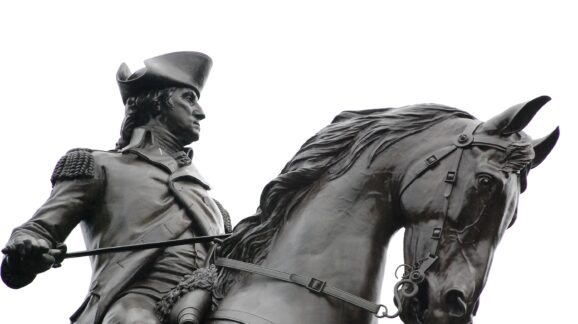Adam Smith, George Washington, and the invisible hand in America

Photo Credit: Getty
Although Adam Smith would have been 300 this year, his birth date is unknown, and his baptism date has shifted from different dates in June due to the 1750’s change in the English calendar. So many of his admirers – including those of us at CEI—are celebrating his birthday the entire month
This means celebrations of Smith’s birthday will soon be followed by celebrations of the birth of the United States of America on the 4th of July. Recent scholarship – some of which has been conducted by me in my book George Washington, Entrepreneur – shows how fitting this is. Many of the founding fathers of the new American nation read Smith and took his teachings to heart. As Katherine Mangu-Ward notes in Reason, Thomas Jefferson wrote to a friend that “in political economy, I think Smith’s wealth of nations the best book extant.”
New scholarship also shows that George Washington almost certainly read Smith’s 1776 book The Wealth of Nations and may have also read Smith’s earlier tome, Theory of Moral Sentiments, published in 1759.
In 2001, a research assistant to Princeton economic professor Alan Krueger discovered Washington’s signature in the 5th edition of The Wealth of Nations, published in 1789, in Princeton’s Rare Book Library. Additional research confirmed Smith’s book was part of Washington’s library. Later, historian Kevin J. Hayes documented in George Washington: A Life in Books– an ambitious intellectual biography of Washington that traces the books he read – that Washington actively engaged with Smith’s facts and arguments by underlining passages in The Wealth of Nations.
Furthermore, letters of Washington published in the 1990s show Washington buying Smith’s earlier book Theory of Moral Sentiments. He purchased the book for his stepson Jack Custis when the young man was attending King’s College in 1773. Though it is unclear if, or how extensively, Washington read this book by Smith, the fact that he purchased it shows Washington had at least some familiarity with its content.
In an op-ed in the New York Times, Princeton economist Krueger quotes an Enlightenment scholar saying the discovery that Washington read Smith “is genuinely thrilling news for historians,” and notes that “some of Washington’s sentiments were clearly Smithian.”
Washington stated, for instance, in his farewell address as president, “Even our commercial policy should hold an equal and impartial hand: neither seeking nor granting exclusive favors or preferences.” This echoes Smith’s many statements against cronyism and the government favoring certain businesses over others.
As I write in George Washington, Entrepreneur, Smith’s critique of British mercantilism would likely have resonated with Washington, who chafed at the red tape that “Mother England” showered on him and other colonial entrepreneurs.
With limited trade routes and heavy shipping costs for goods from Britain, colonists began to make things as well as grow things, just as Washington did with his enterprises at Mount Vernon. The British Parliament saw colonial manufacturing upstarts like the enterprises at Mount Vernon, small as they were when compared to companies in Britain, as a threat to British manufacturers.
As I write in my book, seeing the arbitrary nature of new British taxes and regulations, “Washington increasingly perceived a threat to all he had built.” He expressed this fear in a 1769 letter to his neighbor George Mason, who would also become a significant Founding Father. In the letter, Washington worries that if Great Britain can “order me to buy Goods of them loaded with Duties,” they may also “forbid my manufacturing.”
A few years later, Washington would be appointed head of the Continental Army and lead the American colonies to independence. Then, a few years after setting an example for the world by voluntarily giving up power at the end of the Revolutionary War, Washington would be called to lead the new nation as president.
In his first inaugural address upon taking office in 1789, President Washington uttered a phrase very familiar to readers of Smith. Washington proclaimed in that speech, “No People can be bound to acknowledge and adore the invisible hand, which conducts the Affairs of men, more than the People of the United States.” (Emphasis added.)
As I note in my book, there were some slight difference in the context of Washington and Smith’s use of the phrase “invisible hand.” But there were also some definite commonalities in that both men focused on decentralization, and to some extent, on the higher power they each referred to as “Providence.” As I write:
Smith was writing in the context of trade and wealth distribution, whereas Washington was speaking of the several decisions of individuals that led to the transformation of the 13 colonies into an independent nation, which he believed was guided by “providential agency.” Yet … Both men believed that the best results are most often achieved by the individual decisions of several people uncoerced by a centralized political authority. [And] both argued that such individual human actions leading to a greater social good could indeed be coordinated by a higher power. Just as Washington spoke of a “providential agency” in the inaugural address, Smith expounded on a “Providence” that “neither forgot nor abandoned those who seemed to have been left out in the partition.”
Both men should be remembered and praised this 4th of July when we celebrate the underpinnings of our liberties.